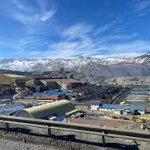 Chile’s lower house has approved a progressive rate on copper sales in what could become one of the heaviest tax burdens in the global mining sector, potentially stalling investment and raising prices.
Chile’s lower house has approved a progressive rate on copper sales in what could become one of the heaviest tax burdens in the global mining sector, potentially stalling investment and raising prices.
Lawmakers, who had already approved a bill to introduce a fixed 3% on sales of both copper and lithium, voted 78 (in favor) to 55 (against) on Thursday to add a marginal rate mechanism as copper prices rise, with the highest bracket set at 75%.
Doing so moves the world’s largest copper industry closer to what the local mining company describes as a “quasi-expropriatory” system. Its supporters, including Communist Party representative Daniel Nunez, have reported that the new mechanism would raise $7 billion a year at a time when Chile is trying to address persistent inequality.
The bill now moves to the Senate.
Giorgio Jackson reported before the vote that “it is imperative to recover economic returns for the Chilean people through mining royalties, rather than continuing to give away transnational private companies.”
Copper prices have reached their highest levels in a decade, benefiting from a recovering global economy and clean energy transformation. Rising prices have prompted politicians in some host nations to seek a greater share of the gain to fight poverty.
For producers, the hit of higher taxes may be partially offset by even higher prices, as a slowdown in investment inhibits their ability to meet future demand.
In Chile, the amendment adds marginal tax rates starting at 15 percent on sales derived from copper prices between $2 and $2.50 a pound and up to 75 percent when prices exceed $4. At current levels, the effective rate would be 21.5%.
Chilean mines operated by companies such as BHP Group and state-controlled Codelco account for 28% of global copper. But many large operations are mature, requiring heavy investment to maintain production levels.
Countries around the world are also looking for new sources of revenue to help their citizens recover from the pandemic. In Chile, efforts to replenish state coffers have been intensified by a process to draft a new constitution after a series of protests over social and economic inequalities in the months leading up to the pandemic.
Lawmakers have passed bills to allow Chileans to draw down some of their pension savings and are proposing a tax on the super-rich and an increase in the minimum wage.
.gif) Loading
Loading

